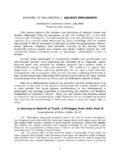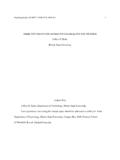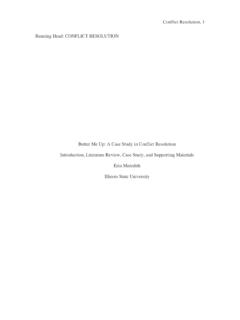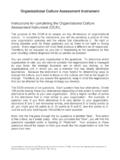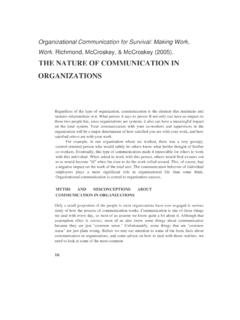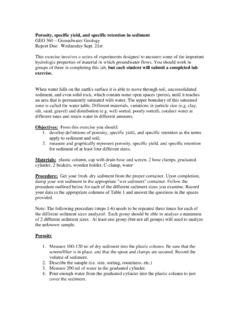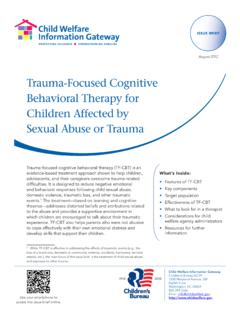Transcription of Internet Addiction - My Illinois State
1 Internet Addiction A New Clinical Phenomenon and Its Consequences KIMBERLY S. YOUNG. St. Bonaventure University Center for Online Addiction New research identifies online users who became hooked on chat rooms, interactive games, and even eBay only to see their lives become increasingly unmanageable because of the Internet . Prior research explores the addictive qualities sustaining drug and alcohol abuse, pathological gambling, and even video game Addiction ; however, given the relative newness of Internet Addiction , little is understood about the habit-forming nature of the Internet and its potential for abuse. As the Internet permeates our lives at home, school, and work, this article takes a closer look at how the Internet can create marital-, academic-, and job-related problems.
2 This article outlines a workable definition of Internet Addiction and as a clinical new phenomenon, explores the major consequences created by Internet Addiction , including online affairs, student Internet abuse, and employee Internet abuse. Future areas for research and practice are also discussed. Keywords: Addiction ; abuse; dependency; Internet ; psychopathology The Internet itself is a neutral device originally designed to facilitate research among academic and military agencies. However, how some people have come to use this communication medium has created a stir among the mental health community by great discussion of Internet Addiction . Addictive use of the Internet is a new and rapidly growing phenomenon. According to the Pew Research Center (2003), Internet use in the United States alone has grown from just less than half of American adults in 2000 to about 59% of adults at the end of 2002, and studies suggest that nearly 6% of online users suffer from Internet Addiction (Greenfield, 1999).
3 New areas of research identify users who became hooked on online chat rooms, instant messaging, interactive games, and even eBay only to see their lives become increasingly unmanageable because of the Internet ( , Morahan-Martin, 1997; Scherer, 1997; Young, 1996). Prior research in the Addiction field explores the addictive qualities sustaining drug and alcohol addictions, pathological gambling, and even video game Addiction . However, AMERICAN BEHAVIORAL SCIENTIST, Vol. 48 No. 4, December 2004 402-415. DOI: 2004 Sage Publications 402. Young / Internet Addiction 403. given the relative newness of the disorder, little exists that clearly outlines the habit-forming nature of the Internet and its consequences. Addiction of any kind is traditionally associated with an uncontrollable urge, often accompanied by a loss of control, a preoccupation with use, and continued use despite problems the behavior causes.
4 Abuse is considered a milder form of Addiction that can also preoccupy and create problems for the user, but the user has more control over the behavior and is better able to set limits and regulate use. Both Addiction and abuse of the Internet can result in consequences. For example, a student who obsessively chats with friends at school takes away from valuable study time resulting in poor academic performance. Or an employee who looks at online pornography during work hours takes away from overall job productivity and his or her actions can even lead to job loss. Although neither example demonstrates a complete lack of control charac- teristic of an Addiction , both examples do briefly illustrate how even general pat- terns of Internet abuse can lead to serious problems for the individual.
5 As the Internet permeates our lives at home, school, and work, this article takes a closer look at how the Internet and its potential for abuse can create marital-, academic-, and job-related problems. This article first defines Internet Addiction so that readers have a workable model to understand the problem from a clinical per- spective. As a new clinical phenomenon, this article also outlines the major con- sequences of Internet Addiction and its associated abuse. Specifically, the impact of online affairs on relationships, the academic impact of student Internet abuse on campuses, and the effects of employee Internet abuse are explored. Finally, given its newness, future areas for research and practice are discussed. DEFINING Internet Addiction . Notions of technological addictions (Griffiths, 1996) and computer addic- tion (Shotton, 1991) have previously been studied in England.
6 However, when Internet Addiction was first introduced in 1996 at the Annual Meeting of the American Psychological Association (Young, 1996), it sparked a controversial debate among both clinicians and academicians. Unlike chemical dependency, the Internet offers several direct benefits as a technological advancement in our society and is not a device to be criticized as addictive (Levy, 1996). These benefits range from practical applications such as conducting research, performing business transactions, accessing libraries, and communicating with colleagues to making vacation plans. Books have been written outlining the psychological as well as functional benefits of the Internet in our daily lives (Rheingold, 1993; Turkle, 1995) and by comparison, chemical dependence is not an integral part of our professional lives, nor does it offer any direct benefit.
7 Furthermore, many researchers argued that the term Addiction should be applied only to cases involving the ingestion of a drug ( , Rachlin, 1990;. 404 AMERICAN BEHAVIORAL SCIENTIST. Walker, 1989). However, defining Addiction has moved beyond this to include a number of behaviors that do not involve an intoxicant, such as compulsive gam- bling (Griffiths, 1990), video game playing (Keepers, 1990), overeating (Lesieur & Blume, 1993), exercise (Morgan, 1979), love relationships (Peele &. Brodsky, 1979), and television viewing (Winn, 1983). During the past decade, a growing body of peer-reviewed literature adapted the term Internet Addiction , and its acceptance as a legitimate disorder grew ( , Ferris, 2001; Greenfield, 1999; Hansen, 2002). DIAGNOSTIC CRITERIA. In general, the Internet is a highly promoted technological tool, making detection and diagnosis of Addiction difficult.
8 Therefore, it is essential to under- stand the criteria that differentiate normal from pathological Internet use. Proper diagnosis is often complicated by the fact that there is currently no accepted set of criteria for Addiction listed in the Diagnostic and Statistical Manual of Mental Disorders (4th ed.) (American Psychiatric Association, 1994). Of all the diag- noses referenced, pathological gambling is viewed as most akin to the compul- sive nature of Internet use (Young, 1996), defining it as an impulse-control dis- order that does not involve an intoxicant and developing the following criteria: 1. Do you feel preoccupied with the Internet (think about previous online activity or anticipate next online session)? 2. Do you feel the need to use the Internet with increasing amounts of time to achieve satisfaction?
9 3. Have you repeatedly made unsuccessful efforts to control, cut back, or stop Internet use? 4. Do you feel restless, moody, depressed, or irritable when attempting to cut down or stop Internet use? 5. Do you stay online longer than originally intended? 6. Have you jeopardized or risked the loss of a significant relationship, job, educa- tional or career opportunity because of the Internet ? 7. Have you lied to family members, therapists, or others to conceal the extent of involvement with the Internet ? 8. Do you use the Internet as a way of escaping from problems or of relieving a dysphoric mood ( , feelings of helplessness, guilt, anxiety, depression)? Only nonessential computer/ Internet usage ( , nonbusiness- or nonacademic- related use) should be evaluated, and Addiction is present when clients answer yes to five (or more) of the questions during a 6-month period.
10 This list offers a workable definition of Internet Addiction to help us differentiate normal from compulsive Internet use, but these warning signs can often be masked by the cul- tural norms that encourage and reinforce its use. That is, even if a person meets all eight criteria, signs of abuse can be rationalized away as I need this for my job or It's just a machine when in reality, the Internet is causing significant problems in a user's life. Young / Internet Addiction 405. Although time is not a direct function in diagnosing Internet Addiction , addicts generally are excessive about their online usage, spending anywhere from 40 to 80 hours per week, with sessions that could last up to 20 hours. Sleep patterns are disrupted due to late night logins, and addicts generally stay up surf- ing until 2:00, 3:00, or 4:00 in the morning with the reality of having to wake up early for work or school.
